
Swimming has been a sport at every modern Summer Olympics. It has been open to women since 1912. At the Olympics, swimming has the second-highest number of medal-contested events.

The men's 200 metre backstroke was an event on the Swimming at the 1900 Summer Olympics schedule in Paris. It was the first Olympic swimming event to not be a freestyle competition. It was held on 11 August and 12 August 1900. 16 swimmers from 7 nations competed. The event was won by Ernst Hoppenberg of Germany, with Karl Ruberl of Austria second and Johannes Drost of the Netherlands third.
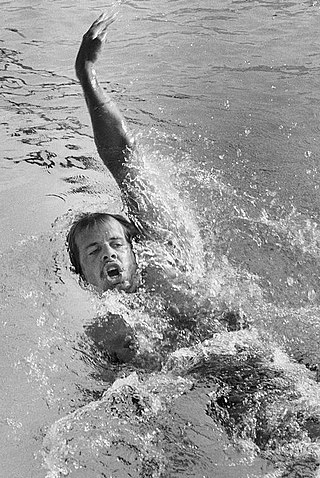
The men's 200 metre backstroke event for the 1976 Summer Olympics was held in Montreal. The event took place on 24 July. There were 33 competitors from 23 nations, with each nation having up to 3 swimmers. The event was won by John Naber of the United States in world-record time; he was the first person to swim the event in under 2 minutes (1:59.19). It was Naber's fifth medal of the Games: completing a double in the backstroke events as well as golds in the medley relay and the 4×200 free relay, along with a silver in the 200 free. It was the second American victory and second American medal sweep in the men's 200 metre backstroke, after 1968; of the 12 medals from 1968 through 1976, 10 were won by Americans and the other two by Roland Matthes. Peter Rocca (silver) and Dan Harrigan (bronze) were the other two Americans, along with Naber, to reach the podium in 1976. The rules changed in 1984 to limit nations to two swimmers each, preventing further sweeps.
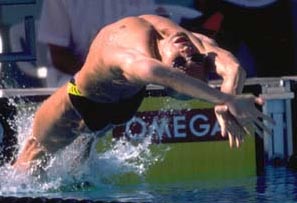
The men's 200 metre backstroke event at the 1992 Summer Olympics took place on 28 July at the Piscines Bernat Picornell in Barcelona, Spain. There were 44 competitors from 34 nations. Each nation had been limited to two swimmers in the event since 1984. The event was won by Martín López-Zubero of Spain. Vladimir Selkov of the Unified Team took silver, while Stefano Battistelli of Italy earned bronze. It was the first medal in the men's 200 metre backstroke for each nation.

The swimming competitions at the 1968 Summer Olympics in Mexico City took place from 17 to 26 October at the Alberca Olímpica Francisco Márquez. Swimming featured a record total of 29 events. There was a total of 468 participants from 51 countries competing. The United States dominated the competition, winning 52 of 87 possible medals. 15-year-old American phenom Debbie Meyer from Maryland won three gold medals.

Fiji sent a delegation to compete at the 1976 Summer Olympics in Montreal, Quebec, Canada, from 17 July to 1 August 1976. This was the nation's fifth appearance at a Summer Olympic Games. Their first appearance was at the 1956 Summer Olympics in Melbourne, Australia. Fiji's delegation consisted of two competitors. Tony Moore who made it to the quarter-finals of the 200m sprint and round 1 in the 100m sprint. After not starting in the 400m sprint, he only made the qualification stage of the long jump. The other athlete was Miriama Tuisorisori-Chambault who competed in the women's pentathlon and long jump. She finished 18th overall in the pentathlon and 27th in qualifying for the long jump. She would not start in the 100m hurdles.

The men's 220 yard freestyle was a swimming event held as part of the Swimming at the 1904 Summer Olympics programme. It was the second time the event was held at the Olympics, though the only time yards were used instead of metres. The length of 220 yards was slightly longer than the 200 metres that had been held at the 1900 Summer Olympics and that would return at the 1968 Summer Olympics. It was held on 6 September in a man-made lake in Forest Park. 4 swimmers from 3 nations competed. The event was won by Charles Daniels of the United States. Francis Gailey of Australia took silver, while Emil Rausch of Germany earned bronze. It was the first medal in the 200 metre/220 yard freestyle for each of the United States and Germany; Australia had received gold in 1900.

The men's 200 metre backstroke event at the 1984 Summer Olympics was held in the Uytengsu Aquatics Center in Los Angeles on July 31, 1984. There were 34 competitors from 25 nations, with each nation limited to two swimmers. The event was won by Rick Carey of the United States, the nation's third victory in the men's 200 metre backstroke. Frédéric Delcourt of France took silver and Cameron Henning of Canada earned bronze; it was the first medal in the event for each of those two nations.
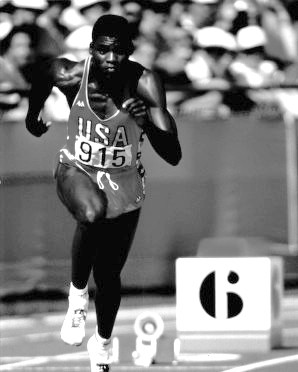
The men's 200 metres at the 1984 Summer Olympics in Los Angeles, California had an entry list of 76 competitors from 58 nations, with ten qualifying heats (76), four quarterfinals (32), and two semifinals (16) before the final (8) took off on Wednesday August 8, 1984. The maximum number of athletes per nation had been set at 3 since the 1930 Olympic Congress. The event was won by Carl Lewis of the United States, the nation's first victory in the men's 200 metres since 1968 and 13th overall. It was the third gold medal of the Games for Lewis, who was attempting to match Jesse Owens in winning the 100, 200, long jump, and 4x100 relay; his victory in this event left only the relay to go, in which the United States was heavily favored. The American team competed a medal sweep in this event, the first since 1956 and the fifth overall for the United States, with Kirk Baptiste earning silver and Thomas Jefferson taking bronze.
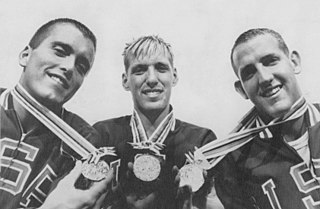
The men's 200 metre backstroke event at the 1964 Summer Olympics took place between October 11 and 13. There were 34 competitors from 21 nations, with each nation having up to 3 swimmers. The medals were swept by the United States, with Jed Graef, Gary Dilley, and Bob Bennett taking gold, silver, and bronze respectively.

The men's 200 metre freestyle event at the 1968 Olympic Games took place on 24 October at the Alberca Olímpica Francisco Márquez. It was the third time the event was held, returning for the first time since 1904. There were 57 competitors from 26 nations, with each nation having up to three swimmers. The event was won by Michael Wenden of Australia, the nation's second victory in the event ; Australia extended its podium streak in the event to three Games over 68 years. It was Wenden's second gold medal of the Games, completing a 100/200 free double. Americans Don Schollander and John Nelson took silver and bronze, respectively.
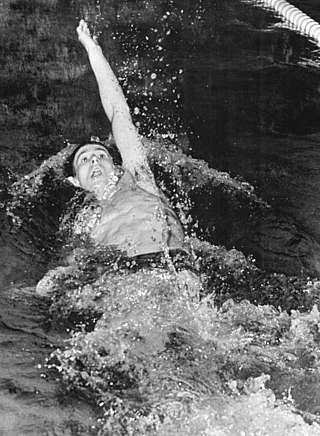
The men's 200 metre backstroke event at the 1968 Summer Olympics took place on 25 October at the Alberca Olímpica Francisco Márquez. There were 30 competitors from 21 nations, with each nation having up to three swimmers. The event was won by Roland Matthes of East Germany, the second gold medal for a German swimmer after Ernst Hoppenberg won in 1900. Matthes completed the backstroke double in the first Games both events were held, with Olympic record times in both. The United States, which had swept the podium in 1964, finished in the next three places behind Matthes: Mitch Ivey took silver, Jack Horsley bronze, and Gary Hall Sr. 4th.
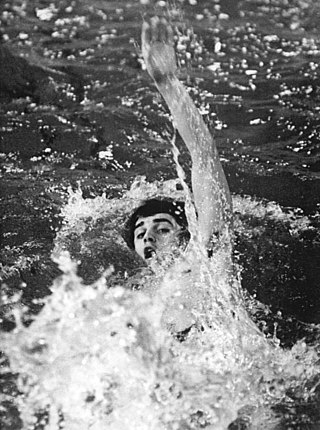
The men's 200 metre backstroke event at the 1972 Summer Olympics took place on September 2 at the Olympia Schwimmhalle. There were 36 competitors from 23 nations, with each nation having up to 3 swimmers. The podium was very similar to the previous Games in 1968, with Roland Matthes of East Germany winning gold and the United States taking the other two medals, including one going to Mitch Ivey. Matthes and Ivey were the first two men to earn multiple medals in the event, with Matthes the first to win back-to-back championships and Ivey adding his 1972 bronze to his 1968 silver. Mike Stamm was the silver medalist in Munich. Matthes also defended his 1968 100 metre backstroke title, giving him the backstroke double a second time.
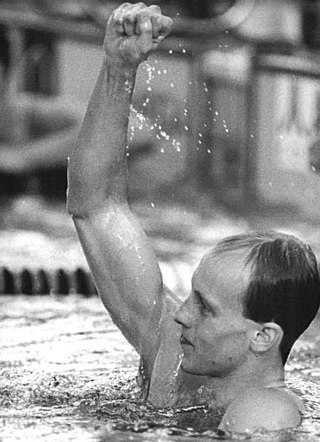
The men's 200 metre backstroke event at the 1988 Summer Olympics took place on 22 September at the Jamsil Indoor Swimming Pool in Seoul, South Korea. There were 44 competitors from 32 nations. Each nation had been limited to two swimmers in the event since 1984. The event was won by Igor Polyansky of the Soviet Union. Frank Baltrusch of East Germany took silver, while Paul Kingsman of New Zealand earned bronze. The medals were the first in the men's 200 metre backstroke for the Soviet Union and New Zealand; East Germany had not medaled in the event since Roland Matthes won gold in 1968 and 1972. For the first time, the United States competed and did not earn at least silver.

The men's 200 metres event at the 1968 Summer Olympics was held in Mexico City, Mexico. The final was won by Tommie Smith in a time of 19.83, a new world record. However, the race is perhaps best known for what happened during the medal ceremony – the Black Power salute of Smith and bronze medallist John Carlos. The background, consequences, and legacy of the salute carried forward into subsequent Olympics and is perhaps the single most memorable event from these Olympics.
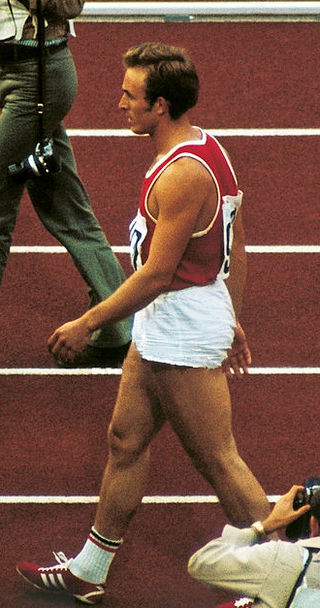
The men's 200 metres was an event at the 1972 Summer Olympics in Munich. The competition was held on 3–4 September. There were 57 competitors from 42 nations. The maximum number of athletes per nation had been set at 3 since the 1930 Olympic Congress. The event was won by Valeriy Borzov of the Soviet Union, the nation's first medal in the event. Larry Black took silver, extending the United States' podium streak in the men's 200 metres to nine Games. Italy earned its first medal in the event since 1960 with Pietro Mennea's bronze.
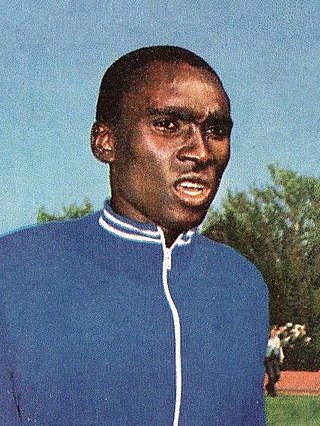
The men's 400 metres hurdles was an event at the 1972 Summer Olympics in Munich. The competition was held on 31 August - 2 September. There were 37 competitors from 25 nations. The maximum number of athletes per nation had been set at 3 since the 1930 Olympic Congress. The event was won by John Akii-Bua of Uganda, the nation's first medal in the event and first gold medal in any Olympic event. Ralph Mann returned the United States to the podium after a one-Games absence with his silver medal, while David Hemery added a bronze to his 1968 gold to become the fifth man to earn multiple medals in the event while extending Great Britain's podium streak in the 400 metres hurdles to three Games.
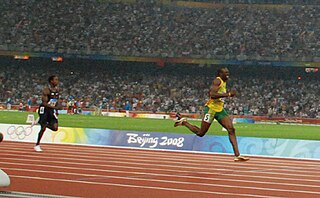
The 200 metres at the Summer Olympics has been contested since the second edition of the multi-sport event. The men's 200 m has been present on the Olympic athletics programme since 1900 and the women's 200 m has been held continuously since its introduction at the 1948 Games. It is the most prestigious 200 m race at elite level. The competition format typically has three or four qualifying rounds leading to a final race between eight athletes.

The sprint hurdles at the Summer Olympics have been contested over a variety of distances at the multi-sport event. The men's 110 metres hurdles has been present on the Olympic athletics programme since the first edition in 1896. A men's 200 metres hurdles was also briefly held, from 1900 to 1904. The first women's sprint hurdling event was added to the programme at the 1932 Olympics in the form of the 80 metres hurdles. At the 1972 Games the women's distance was extended to the 100 metres hurdles, which is the current international standard.

The 200-metre backstroke event is an event held at the Summer Olympic Games. The men's event was introduced in 1900, then was not held again until 1964, with a 100-metre backstroke) held from 1904 to 1960. When the event returned in 1964, it replaced the men's 100-metre backstroke for that year; in 1968, both the 100- and 200-metre versions were held for men. The 200-metre backstroke has been held at every Summer Games since 1964. The women's backstroke was introduced in 1968, and it has been held at every Summer Olympics since.



















